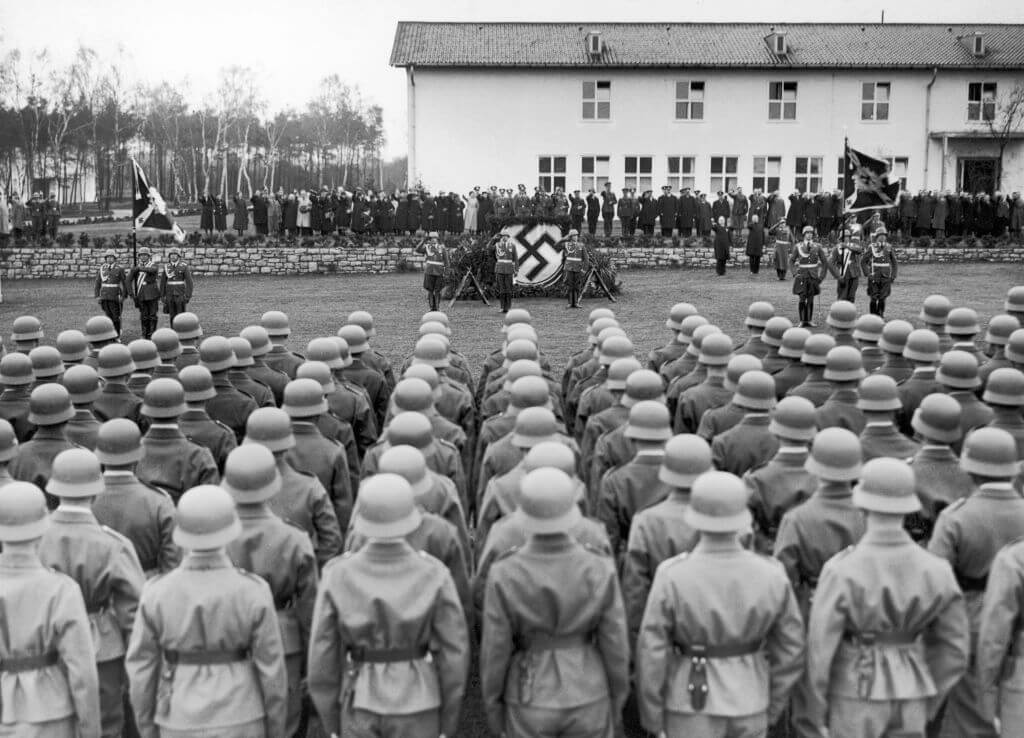Who was Horst Wessel, and why are people comparing Charlie Kirk to him?
Within hours of Kirk’s death, opposite ends of the political spectrum invoked the Nazi martyr

German recruits to a Luftwaffe Luftnachrichten (signals) unit sing the Horst Wessel Song at their swearing-in ceremony at the newly opened Luftkriegsschule Berlin-Gatow in Gatow, southwest Berlin, April 25, 1936. Photo by FPG/Hulton Archive/Getty Images
When Charlie Kirk, the 31-year-old conservative founder of the nation’s top right-wing youth activist group, was assassinated Wednesday during a speaking engagement at a Utah university, the reaction was swift. President Donald Trump, a close ally, ordered flags to half-staff. Evangelical pastors called him a “modern-day MLK” and an Orthodox rabbi dubbed him “the Abraham of our times.”
But in some corners of the internet, a different name surfaced: Horst Wessel. Within hours of Kirk’s death, people were comparing him to the young Nazi activist whose 1930 murder turned him into a martyr for Adolf Hitler’s movement.
These comparisons came from opposite ends of the political spectrum. Some on the far left warned that Trump could use Kirk’s death to consolidate power, just as Hitler had with Wessel’s death. At the same time, Wessel’s name remains revered in neo-Nazi circles, where invoking him carries a darker meaning.
Who was Horst Wessel?
Wessel, whose father was a pastor, was born in 1907 in Bielefeld, Germany. He was the oldest of three children, and as a teenager he joined a right-wing youth group. At 19, he enrolled in university to study law, then a few years later gave up his studies to pursue Nazi activism.
He was a charismatic member of the paramilitary wing of the Nazi Party who “was interested in talking to the other side,” said Daniel Siemens, a professor of European history at Newcastle University and author of the book The Making of a Nazi Hero: The Murder and Myth of Horst Wessel.
Wessel made a name for himself convincing working class people to join the Nazi Party, Siemens said in an interview. “He basically was a good bridge builder between traditional conservative leaders and theoretical Nazis,” said Siemens. “And that’s what made him particularly useful after his death, as someone who could combine and bring people together posthumously.”
The circumstances of his death in 1930 at the age of 22 are not entirely clear, but according to Siemens, he was most likely killed by a group of communists after a dispute related to unpaid rent.
After his murder, Wessel was held up as a martyr of the Nazi cause. The “Horst Wessel Song” became the official anthem of the Nazi Party and later the German co-national anthem.
“School children had to sing it,” Siemens said. “So it was really a household name in the 1930s in Nazi Germany.”
The song has been banned in Germany and Austria since the end of World War II.
Why are people comparing Charlie Kirk to him?
For some on the far left, Kirk isn’t being described as a Nazi, but there’s worry that his death could be politicized as Wessel’s was. “They basically want to level criticism on Trump and his supporters,” Siemens said of the far left. “Because, for them, every kind of parallel to Nazism, every allusion to Nazism, is obviously very bad.”
The concern is that Trump could hold up Kirk as proof that conservative Christians are under attack, just as Hitler used Wessel’s story to galvanize the Nazi base. Already, pastors and politicians have framed Kirk’s assassination as martyrdom. One Oklahoma pastor said, “Charlie died for what he believed in; he died for something greater than just himself.”
In a video address from the Oval Office, Trump blamed liberal rhetoric for fueling violence, saying some “have compared wonderful Americans like Charlie to Nazis,” which he called “directly responsible for the terrorism that we’re seeing in our country today.” He vowed to target the groups that fund or support such attacks.
On the far right, Wessel “is a name that the neo-Nazis of today know very well,” said Siemens. In those circles, Wessel is considered a “good Nazi” — someone who died too early to be implicated in the Holocaust. Siemens added: “For them, this is a moment of glorification and elevation.”
Are the comparisons valid?
Siemens, a historian, said not to compare the two men “at all costs.”
If you do, you risk legitimizing the National Socialism ideology that gave rise to Nazism, Siemens said.
And it’s inaccurate. Wessel was comfortable with violence and organized an attack on the local Communist Party headquarters that injured four people. While Kirk’s rhetoric was combative — he railed against immigrants, gender ideology and “global elites” — he operated in a democratic system and advocated for civil disagreement.
The bigger parallel may lie not in the men themselves but in how their deaths are used. Siemens warned that resurrecting Wessel’s name shows that “neo-Nazi martyrology is still alive to a certain extent.” And the fact that more Americans seem familiar with Wessel now than when he first researched his book more than a decade ago, he added, “indirectly tells us there is a growing fascination with these figures, and maybe even with aspects of Nazi ideology.”
The rush to invoke Horst Wessel’s name reflects two realities. On the right, there’s a dangerous willingness among some extremists to valorize Nazi symbols. On the left, a fear that Kirk’s death will be used to erode civil liberties.
Siemens’ advice is simple: steer clear. “It’s a slippery slope,” he said, adding that “the people that you choose as your heroes” should “engage in civil discussion and dialogue, and not this mixture of political radicalism that activates violence.”
















